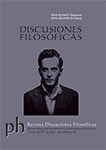Autores/as
Resumen
En este artículo examino si el noconceptualismo es una forma del Mito de lo Dado y argumento que las percepciones, incluso si su contenido es no-conceptual, pertenecen al ‘espacio de las razones’. Defenderé la tesis de que las experiencias perceptuales pertenecen legítimamente al espacio lógico de las razones syss satisfacen las siguientes tres condiciones (i) tienen contenido semántico, (ii) están gobernadas por reglas, y (iii) tienen unas propiedades tales que por su naturaleza se podría decir que cuando una experiencia perceptual las satisface, constituye una razón para creer algo.
Citas
---. Experience, Thought and Activity: their content, their normativity and their characteristic kinds of commitment. Longer version from that published in York Gunther. Massachusetts: MIT Press, 2002. Print.
---. Content, Conceptual Content, and Nonconceptual Content. En: Essays on Nonconceptual Content. Gunther. Massachusetts: MIT Press, 2002. Print.
Davidson, Donald. Subjective, Intersubjective, Objective. Berkeley: University of California, 1983. Print.
Evans, Gareth. The Varieties of Reference. Ed. John McDowell. Oxford: Clarendon Press, 1982. Print.
Haugeland, John. Having Thought: Essays in the Metaphysics of Mind. Massachusetts: Harvard University Press, 1998. Print.
Heck, Richard. “Nonconceptual Content and the "Space of Reasons"”. The Philosophical Review 109.4 (2000): 483-523. Web.
Kelly, Sean. “The Non-conceptual Content of Perceptual Experience: Situation Dependence and Fineness of Grain”. Philosophy and Phenomenological Research LXII.3 (2001): 601-608. Web.
McDowell, John. Having the world in view: Essays on Kant, Hegel, and Sellars. Cambridge: Harvard University Press, 2009. Print.
---. Mind and World. Cambridge: Harvard University Press, 1994. Print.
Sellars, Wilfrid. “Empiricism and the Philosophy of Mind”. Minessota Studies in the Philosophy of Science 1 (1956): 253-329. Web.

 pdf
pdf
 FLIP
FLIP

























